Feasts of Our Lady
 |
 |
 |
 |
 |
 |
 |
St. Philip Neri – May 26 – Part II
Today I will comment excerpts from a reading on St. Philip Neri.(1)
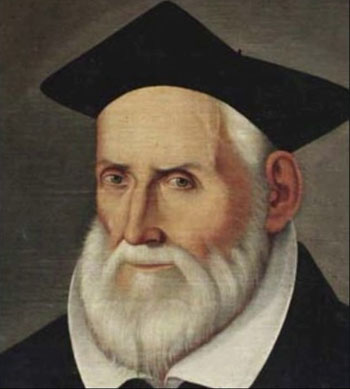 “St. Philip Neri was born in Florence on July 15, 1515, and died on May 25, 1595. It is said that for 30 years he spent all his nights in the catacombs. When he found the churches closed, he would say his prayers on the porches of the churches. More than once he was seen reading in the moonlight.”
“St. Philip Neri was born in Florence on July 15, 1515, and died on May 25, 1595. It is said that for 30 years he spent all his nights in the catacombs. When he found the churches closed, he would say his prayers on the porches of the churches. More than once he was seen reading in the moonlight.”
The image is poetic: a pious young student, a future saint, haloed with virtue and who, in the moonlight in a city, is reading…
It is important to remember that at that time there was no public lighting on the streets. Public lighting began in the 17th century. And since it was very expensive to have candles inside houses, people were forced to go to bed early.
So it was a sign of virtue for a young man to risk his vision and read in the moonlight. But in Rome it takes on a poetic air: Sitting atop the ruins, near an old Roman column, stroking the head of a stone lion brought from Egypt, etc... In short, the whole atmosphere of ancient Rome, with its picturesque and artistic disorder.
“On the day of Pentecost in 1545, he was in the catacomb of St. Calixtus begging the Holy Spirit to grant him His gifts. Suddenly there appeared to him a luminous sphere, like a globe of fire, which entered his lips and passed into his breast.
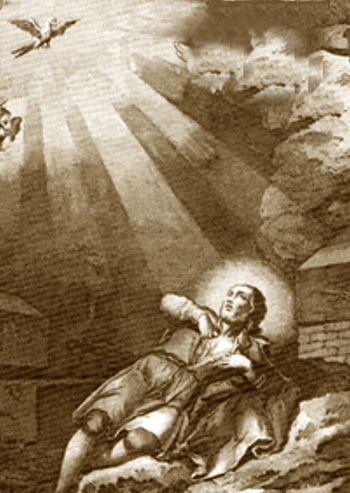 “At the same moment he felt his heart as if a flame. Unable to bear the excess of this heat, he threw himself to the ground. When he arose, he placed his hand on his side over his heart; his love was so great that his chest had swollen, although it did not give him the slightest pain.
“At the same moment he felt his heart as if a flame. Unable to bear the excess of this heat, he threw himself to the ground. When he arose, he placed his hand on his side over his heart; his love was so great that his chest had swollen, although it did not give him the slightest pain.
“When he died in 1595, doctors opened his chest to examine the miracle; they discovered that two ribs had broken above his heart and had not closed, such was the force of God's love that he had felt.
“After this blessed Pentecost, the Saint experienced a continuous palpitation of the heart every time he was engaged in divine things.
“Many noble personages entered religious orders, inspired by the example of this simple layman. Once St. Ignatius of Loyola, who knew him well, reprimanded him with familiar affection for remaining secular. And he compared him to a bell, which called everyone into the Church but himself stayed in the belfry.”
You are seeing the graceful playfulness, amiable and light, between two Saints. What would have been the conversation between a Saint who had been so imbued with the gifts of the Holy Spirit and another to whom Our Lady had dictated the Spiritual Exercises in the grotto of Manreza?
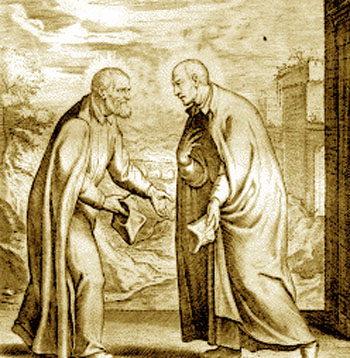 Now that would be a talk to hear! This prattle of today is nothing, inexpressive and unworthy babble in relation to the great conversations of the great saints…
Now that would be a talk to hear! This prattle of today is nothing, inexpressive and unworthy babble in relation to the great conversations of the great saints…
“One night, as he was going, according to his custom, to the house of a noble who had fallen destitute to bring him some food, he met a carriage along the way. Moving aside for it, he realized he was falling into a very deep hole. But the Angel of the poor man whom he was going to help watched over him, miraculously raising him into the air and preventing him from falling into the hole.”
Let us imagine St. Philip Neri walking through the streets of Rome, taking alms to a poor man and that man’s Guardian Angel accompanying him.
You might say: “But why didn’t his Guardian Angel help him? Why the poor man’s Guardian Angel?”
First, because the poor man was interested in his benefactor getting there; second, because God desired to clearly show in this way His gratitude for the alms he was taking to the poor man. Doing a good to the poor gives us the right to special assistance from God Our Lord.
But if helping the poor – who have few or no monetary assets – is so beneficial, how much more so is giving assistance to those who have no spiritual goods? This would be, for example, to give some good advice, to make an apostolate, to bring someone to the Counter-Revolution, to “corner” a revolutionary with a strong logical argument so that he loses his prestige and cannot harm others…
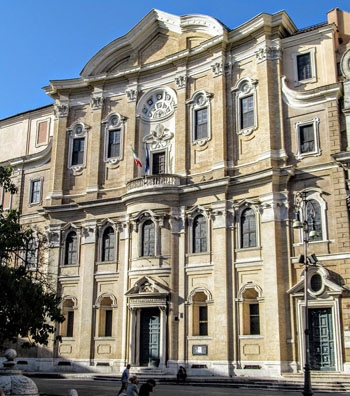 When meeting a person to do him some spiritual good, we could ask the Guardian Angel of that person to help us. It would be a beautiful and noble request.
When meeting a person to do him some spiritual good, we could ask the Guardian Angel of that person to help us. It would be a beautiful and noble request.
“The mere sight of a Jew made him shed torrents of tears. And he applied himself with all his strength to obtain their conversion.”
Seeing the Jews, who were generally rich, he wept. Why? Because he realized that the wealthy Jew was much more unhappy than one who, having less money, has the gift of Faith. Faith is worth more than a fortune: That is the lesson that this fact contains.
“One day he had entered the Church of St. John Lateran with a nobleman Prospero Crivelli, who had with him a Jew. When they entered the church and knelt down before the Blessed Sacrament, the Jew alone stood with his head covered and his back turned to the altar. Seeing this, Philip said to him, 'My good man, listen to me. Join me in this prayer, ‘If thou, Christ, art really God, inspire me to become a Christian.’
“’I cannot do that,’ replied the Jew, ‘because I am not permitted to doubt my religion.’
“Philip then turned to the nobleman and bystanders and said, ‘Come, my brothers, let us help this man; through our prayers he will certainly become a Christian.’ The Jew could not resist the prayers of the Saint. A few days later, he received Baptism.”
This was the prayer of a Great Saint!
 “It was especially during carnival that St. Philip Neri redoubled his prayers. With an imposing mass of the faithful he made a pilgrimage through the streets to the seven Basilicas of Rome to protest against the immorality of its citizens during
carnival.”
“It was especially during carnival that St. Philip Neri redoubled his prayers. With an imposing mass of the faithful he made a pilgrimage through the streets to the seven Basilicas of Rome to protest against the immorality of its citizens during
carnival.”
Here you see his combativity. The city is being taken over by a frenzied carnival. What does he do? He organizes pilgrimages to travel through the streets of that same city as an act of reparation to God. It is a counter-carnival. He did not just make some timid little sermons inside the church about the carnival – and today even these have disappeared; rather, he made a counter-carnival: “Let us hold our own processions to protest the carnival.”
That is how you fight. That is what fighting is!
“The Cardinal Vicar summoned the Saint and, after strongly censuring him for his pilgrimages and accusing him of doing this for his own glory rather than the glory of God, forbade him from hearing confession or making any public acts for 15 days.
“The Vicar died suddenly before the penalty could be lifted. And Pope Paul IV, whom he had called on to judge the case, ordered the Saint to resume his exercises, and asked him to pray for him.
An order to Baronius
“Since spiritual discourses were delivered every day in the Oratory, which was the seat of his apostolate, the Saint determined to impose on one of the preachers to write the History of the Church from her beginning compiled from authentic sources. His goal was to show clearly the true success of the Holy Church and consequently reveal the falsehood of the heretics, especially of the Protestant historians. (2)
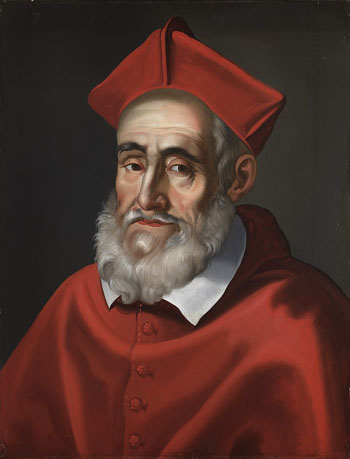 “He urged Cardinal Cesare Baronius to undertake this work, but the wise Baronius recoiled from the immensity of the task, insisting that there were wiser and holier men more capable than he. But St. Philip Neri was adamant: “Do what I command you.”
“He urged Cardinal Cesare Baronius to undertake this work, but the wise Baronius recoiled from the immensity of the task, insisting that there were wiser and holier men more capable than he. But St. Philip Neri was adamant: “Do what I command you.”
Baronius was subject to St. Philip because he belonged to the Congregation of the Oratory. This great work, the Annales Ecclesiastici (Ecclesiastical Annals), became famous in the life of the Church! It is one of the great works of Catholic erudition. (3)
“In the month of May 1594 the Saint was struck down by tertian fever. It was thought that all was lost. All those attending him were in despair when suddenly the sick man, drawn by an unknown force, was lifted from his bed by about a foot and suspended in the air between earth and heaven. During this time, the Blessed Virgin visited him and restored him to both life and health.”
This is really something. Can you imagine entering the room of someone who is dying and finding that person suspended between heaven and earth? Then, suddenly, he returns to his bed, sits up and says: “I am fine. The Madonna has come and healed me.” He is ready to return to his life. It is extraordinary!
Hearing this should do one a lot of good. But until we begin to take everything completely seriously, even miracles do not do us much good. They produce a fleeting impression and then we return to our prior state of mind. We need to get used to taking everything seriously, otherwise even miracles do us no real good.
We may not forget it, which is one thing, taking things seriously is another. We should ask Our Lady for the grace of the habit of taking things completely seriously.
What does it mean to take things seriously?
St. Paul took what happened to him on the road to Damascus seriously: he fell to the ground and drew the full consequences of what happened to him. Immediately, he exclaimed: “Lord, what do you want me to do?” In other words, taking something seriously means to see, to judge and to act. He saw that his actions were bad, he heard the voice of God, he drew his conclusions and wanted to act: “My God, what do you want me to do?”
“A year later [at age 80] he was suddenly overcome by a hemorrhage. After Cardinal Baronius had finished the prayers for the dying, the Saint gave his blessing to the fathers kneeling around him.
“At that same hour at which he died, St. Philip appeared to many persons, and several people saw him ascend to the Heavens with enormous glory.”
This is taking things seriously: “Very good, I have made my decision. Now I will do what I must do. Even if I die or get blown up, I will do it.”

St. Philip Neri, His Fight against Protestantism


The Saint of the Day features highlights from the lives of saints based on comments made by the late Prof. Plinio Corrêa de Oliveira. Following the example of St. John Bosco who used to make similar talks for the boys of his College, each evening it was Prof. Plinio’s custom to make a short commentary on the lives of the next day’s saint in a meeting for youth in order to encourage them in the practice of virtue and love for the Catholic Church. TIA thought that its readers could profit from these valuable commentaries.
The texts of both the biographical data and the comments come from personal notes taken by Atila S. Guimarães from 1964 to 1995. Given the fact that the source is a personal notebook, it is possible that at times the biographic notes transcribed here will not rigorously follow the original text read by Prof. Plinio. The commentaries have also been adapted and translated for TIA’s site.

St Philip Neri, 1515-1595
The image is poetic: a pious young student, a future saint, haloed with virtue and who, in the moonlight in a city, is reading…
It is important to remember that at that time there was no public lighting on the streets. Public lighting began in the 17th century. And since it was very expensive to have candles inside houses, people were forced to go to bed early.
So it was a sign of virtue for a young man to risk his vision and read in the moonlight. But in Rome it takes on a poetic air: Sitting atop the ruins, near an old Roman column, stroking the head of a stone lion brought from Egypt, etc... In short, the whole atmosphere of ancient Rome, with its picturesque and artistic disorder.
“On the day of Pentecost in 1545, he was in the catacomb of St. Calixtus begging the Holy Spirit to grant him His gifts. Suddenly there appeared to him a luminous sphere, like a globe of fire, which entered his lips and passed into his breast.

A globe of fire enters his chest On Pentecost 1545
“When he died in 1595, doctors opened his chest to examine the miracle; they discovered that two ribs had broken above his heart and had not closed, such was the force of God's love that he had felt.
“After this blessed Pentecost, the Saint experienced a continuous palpitation of the heart every time he was engaged in divine things.
“Many noble personages entered religious orders, inspired by the example of this simple layman. Once St. Ignatius of Loyola, who knew him well, reprimanded him with familiar affection for remaining secular. And he compared him to a bell, which called everyone into the Church but himself stayed in the belfry.”
You are seeing the graceful playfulness, amiable and light, between two Saints. What would have been the conversation between a Saint who had been so imbued with the gifts of the Holy Spirit and another to whom Our Lady had dictated the Spiritual Exercises in the grotto of Manreza?

St Philip Neri & St. Ignatius
meet in the streets of Rome
“One night, as he was going, according to his custom, to the house of a noble who had fallen destitute to bring him some food, he met a carriage along the way. Moving aside for it, he realized he was falling into a very deep hole. But the Angel of the poor man whom he was going to help watched over him, miraculously raising him into the air and preventing him from falling into the hole.”
Let us imagine St. Philip Neri walking through the streets of Rome, taking alms to a poor man and that man’s Guardian Angel accompanying him.
You might say: “But why didn’t his Guardian Angel help him? Why the poor man’s Guardian Angel?”
First, because the poor man was interested in his benefactor getting there; second, because God desired to clearly show in this way His gratitude for the alms he was taking to the poor man. Doing a good to the poor gives us the right to special assistance from God Our Lord.
But if helping the poor – who have few or no monetary assets – is so beneficial, how much more so is giving assistance to those who have no spiritual goods? This would be, for example, to give some good advice, to make an apostolate, to bring someone to the Counter-Revolution, to “corner” a revolutionary with a strong logical argument so that he loses his prestige and cannot harm others…

Oratorio dei Filippini (Oratory of Saint Philip Neri) in Rome where daily discourses were delivered
“The mere sight of a Jew made him shed torrents of tears. And he applied himself with all his strength to obtain their conversion.”
Seeing the Jews, who were generally rich, he wept. Why? Because he realized that the wealthy Jew was much more unhappy than one who, having less money, has the gift of Faith. Faith is worth more than a fortune: That is the lesson that this fact contains.
“One day he had entered the Church of St. John Lateran with a nobleman Prospero Crivelli, who had with him a Jew. When they entered the church and knelt down before the Blessed Sacrament, the Jew alone stood with his head covered and his back turned to the altar. Seeing this, Philip said to him, 'My good man, listen to me. Join me in this prayer, ‘If thou, Christ, art really God, inspire me to become a Christian.’
“’I cannot do that,’ replied the Jew, ‘because I am not permitted to doubt my religion.’
“Philip then turned to the nobleman and bystanders and said, ‘Come, my brothers, let us help this man; through our prayers he will certainly become a Christian.’ The Jew could not resist the prayers of the Saint. A few days later, he received Baptism.”
This was the prayer of a Great Saint!

The Seven Churches Pilgrimage was conceived by St. Philip Neri; above, a night pilgrimage
Here you see his combativity. The city is being taken over by a frenzied carnival. What does he do? He organizes pilgrimages to travel through the streets of that same city as an act of reparation to God. It is a counter-carnival. He did not just make some timid little sermons inside the church about the carnival – and today even these have disappeared; rather, he made a counter-carnival: “Let us hold our own processions to protest the carnival.”
That is how you fight. That is what fighting is!
“The Cardinal Vicar summoned the Saint and, after strongly censuring him for his pilgrimages and accusing him of doing this for his own glory rather than the glory of God, forbade him from hearing confession or making any public acts for 15 days.
“The Vicar died suddenly before the penalty could be lifted. And Pope Paul IV, whom he had called on to judge the case, ordered the Saint to resume his exercises, and asked him to pray for him.
An order to Baronius
“Since spiritual discourses were delivered every day in the Oratory, which was the seat of his apostolate, the Saint determined to impose on one of the preachers to write the History of the Church from her beginning compiled from authentic sources. His goal was to show clearly the true success of the Holy Church and consequently reveal the falsehood of the heretics, especially of the Protestant historians. (2)

Caesar Baronius, an Italian Oratorian, Cardinal and historian of the Catholic Church.
Baronius was subject to St. Philip because he belonged to the Congregation of the Oratory. This great work, the Annales Ecclesiastici (Ecclesiastical Annals), became famous in the life of the Church! It is one of the great works of Catholic erudition. (3)
“In the month of May 1594 the Saint was struck down by tertian fever. It was thought that all was lost. All those attending him were in despair when suddenly the sick man, drawn by an unknown force, was lifted from his bed by about a foot and suspended in the air between earth and heaven. During this time, the Blessed Virgin visited him and restored him to both life and health.”
This is really something. Can you imagine entering the room of someone who is dying and finding that person suspended between heaven and earth? Then, suddenly, he returns to his bed, sits up and says: “I am fine. The Madonna has come and healed me.” He is ready to return to his life. It is extraordinary!
Hearing this should do one a lot of good. But until we begin to take everything completely seriously, even miracles do not do us much good. They produce a fleeting impression and then we return to our prior state of mind. We need to get used to taking everything seriously, otherwise even miracles do us no real good.
We may not forget it, which is one thing, taking things seriously is another. We should ask Our Lady for the grace of the habit of taking things completely seriously.
What does it mean to take things seriously?
St. Paul took what happened to him on the road to Damascus seriously: he fell to the ground and drew the full consequences of what happened to him. Immediately, he exclaimed: “Lord, what do you want me to do?” In other words, taking something seriously means to see, to judge and to act. He saw that his actions were bad, he heard the voice of God, he drew his conclusions and wanted to act: “My God, what do you want me to do?”
“A year later [at age 80] he was suddenly overcome by a hemorrhage. After Cardinal Baronius had finished the prayers for the dying, the Saint gave his blessing to the fathers kneeling around him.
“At that same hour at which he died, St. Philip appeared to many persons, and several people saw him ascend to the Heavens with enormous glory.”
This is taking things seriously: “Very good, I have made my decision. Now I will do what I must do. Even if I die or get blown up, I will do it.”
- Excerpts from a Saint of the Day of October 8, 1973
- The Centuries were a series of historical essays, whereby the Protestants sought to prove that the Roman Church had changed the ancient faith of the Early Christians and introduced superstitious practices. This work with its falsified quotations, its misrepresentation and its frequent invention of facts was intended to do great injury.
- The Annals present the history of the first 1200 years of the History of the Church, including Council documents, decrees, encyclicals, etc. This historical work helped to check the progress of Protestantism demonstrating the Church as the pillar and firmament of the truth (1 Tim 3:15)

 | |
|
|
The texts of both the biographical data and the comments come from personal notes taken by Atila S. Guimarães from 1964 to 1995. Given the fact that the source is a personal notebook, it is possible that at times the biographic notes transcribed here will not rigorously follow the original text read by Prof. Plinio. The commentaries have also been adapted and translated for TIA’s site.


